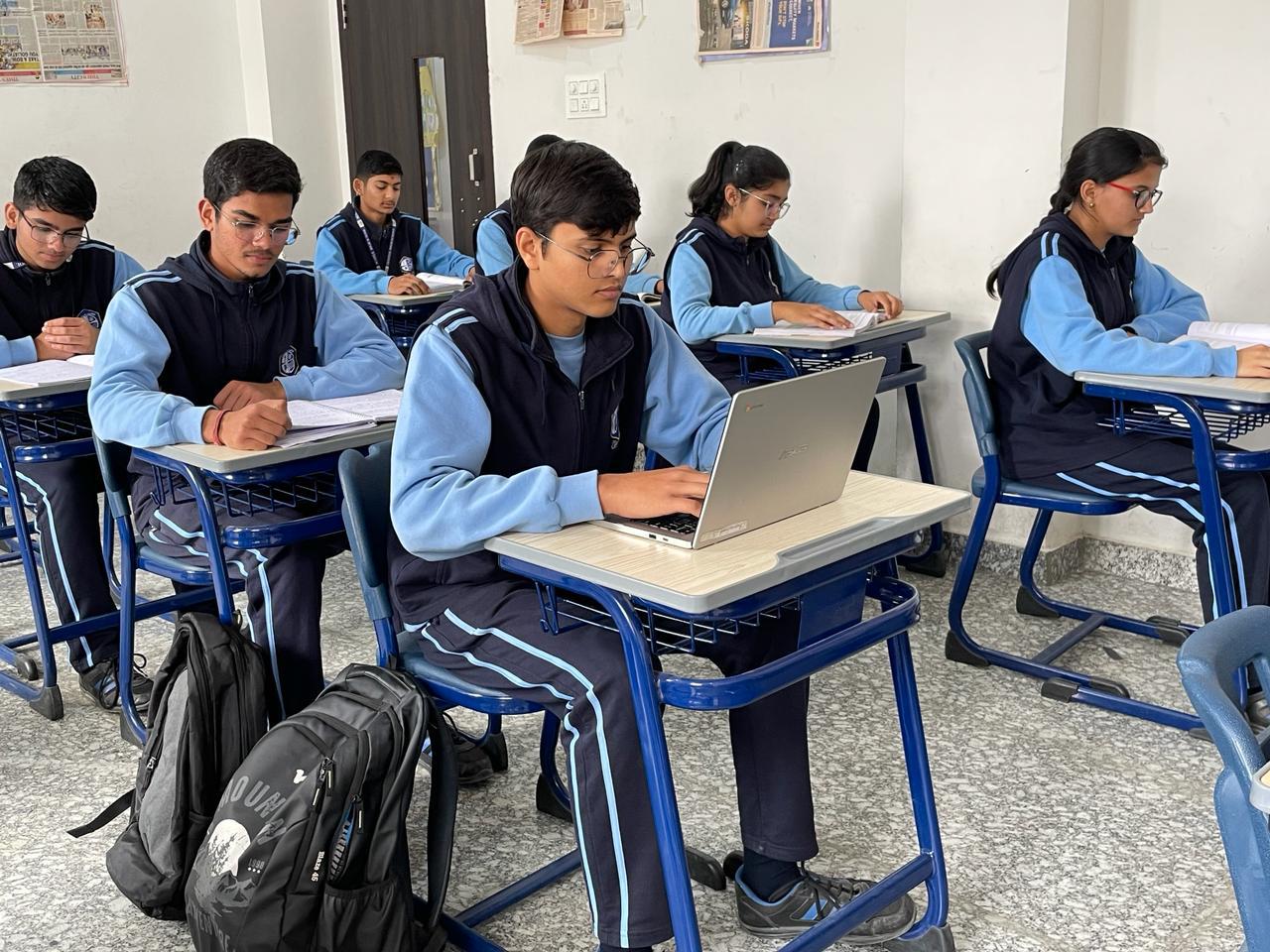India has come full circle in learning from the Gurukul parampara up to the generation of AI. The Gurukul Shikshan Pranali taught us to be self-sufficient and self-reliant. The moment we abandoned this educational system, this sword lingered on our educational system making us the puppet of the foreign educational system that got us caught into the followers mode and we paid the cost of it, by losing our core system of E.Q.
“The emotionally intelligent person is skilled in four areas: identifying emotions, using emotions, understanding emotions, and regulating emotions.” — John Mayer and Peter Salovey
In the era of rapid technological advancements, the world is witnessing a seismic shift from the traditional emphasis from Intelligence Quotient (IQ) to recognizing the paramount importance of Emotional Intelligence (EQ) that is intra-personal (self awareness, self belief, positive attitude, assertiveness and resilience) and interpersonal shifts (Communication, Empathy, Leadership, Negotiation, Cognitive Thinking).
Culture, Psychological Safety, Kindness and Empathy at work is a paradigm shift we need to garner. As Artificial Intelligence (AI) becomes an omnipresent force, the need for harnessing emotional intelligence has never been more critical than ever before. At this juncture the education system witnesses this paradigm shift. We at Scotle are heading towards revolutionizing this educational system bit by bit, by providing the students with the skill set required to combat the new age problem, looming in for us in the near future. Where-in technological advancements have brought ease within the human generation. It’s where Humans are hooked and machines are learning.
Towards EQ (The Unfolding Narrative)
Historically society has always questioned and glorified the EQ until the advent of AI. The focus now shifts towards skills and Critical learning that all of a sudden the whole world is talking about, which AI lacks – the emotional and interpersonal capacities encapsulated by EQ.
“It’s not the most powerful animal that survives. It’s the most efficient.”
– Georges St-Pierre.
The rise of A.I has initiated a recalibration in the skill sets that are deemed essential for the future of the human race.
AI, while being immensely powerful, lacks the ability to comprehend and navigate the complexities of human emotions. That’s where the dire need to sharpen the E.Q skill arises from.
This is where EQ would play a pivotal role in safeguarding humanity. As we stand on the brink of an AI- dominated future, where the I.Q is being fed by humans, and the EQ needs to be sharpened for our future. Individuals with high emotional intelligence will become the indispensable source of the new world order. The unique human abilities of empathy, creativity, and interpersonal understanding are not only irreplaceable but also essential for ethical decision-making and the preservation of our collective humanity. This work needs immediate attention and, rather, it’s the need of the hour.
Implementing EQ is a Global Perspective:
Several countries are pioneering the integration of EQ into their educational systems, recognizing its instrumental role in preparing students for the challenges of their future life.
As education being one and only remedy to compact with A.I.
Finland being one of the countries where the most important focus of the education policy is emphasized on quality, efficiency, equity and internationalization. It is founded on the principles of ‘Lifelong Learning’ and ‘Free Education’. Renowned for its progressive education system, Finland has embedded social and emotional learning (SEL) into its curriculum. Students are taught skills like Self-awareness, Self-regulation, and Interpersonal communication from an early age.Teaching methods in Finland specifically assist students in cultivating skills in critical thinking, enthusiasm for education, and a strong sense of community this is what Scotle High imbibes in its curriculum as well.
“Rome was not built in a Day”
-John Heywood’s
It’s a continuous process for a never ending loop of learning and redoing what is redundant. Singapore, being another place, which has a strong emphasis on character and citizenship education, focusing on values, socio-emotional skills, and ethics. This approach is aligned with the understanding that academic excellence alone is insufficient for holistic development.The Singaporians understand and accept that each student learns differently and has specific unique strengths; they also believe that each child can achieve their educational goals at their own pace. This offers all students an equal opportunity in the real world. Other countries who have realized the importance of SEL, are The UK and Canada: Raising alertness levels and reducing absenteeism by allowing teenagers to sleep in class. While a school in London became the first to allow teenagers to have a later start. China places an emphasis on practicing math and on learning the concepts and logic behind problems, meaning that children are equipped with the necessary knowledge to approach unfamiliar problems more successfully. Needless to mention that community service is widely accepted as a part of schooling culture and western law abiding authorities as well.
These countries are implementing nothing else but sowing EQ for the future society. Countries have preserved and enriched their social and cultural heritage and educational system, also this comes from a great sense of pride and patriotism. Which needs to be instilled in the young generation.
Outlook, of Indian society is majorly distinguished and is not integrated, where a larger sector of the society truly believes that IQ is the only way a student can get a huge pay package and a golden ticket for the future. Failing to comprehend that the more balanced Socio-Emotional skills the student possess the more suitable and sustainable the future job market will be as we saw the evolution of computers in the 90’s, then came the cell phone era, followed by the internet and later every household had internet connection taking away the EQ from the students. Easy availability of the mobile phones diminished the idea of reading, largely affecting various levels within the society where reading was no longer considered a skill and the physical books and book stalls almost are at the verge of extinction. Curriculum has been given the utmost priority. The child lacks basic LSRW skill which has reached to paramount condition, making students a puppet of rapid development.
The youth today had enslaved itself to the machines, where in its a very ironic circle of data being fed and then the same data is furnished under the pretext of information being given by the machine. So, eventually no learning happens in this process. The entire act is just a hustle. We as a nation need to work individually, socially, educationally and politically towards restoring age old traditional forms of Kinesthetic learning forms where the student is taught the ways of living and learning, however each individual yet learns and conserves their individuality and is able to strengthen it rather than learning liberalized ways of so called Modern Education system where each one of the student possess a set of capabilities in which it will naturally excel.The compulsory learning system diminishes curiosity and natural learning skill of a student.
A child is a wet clay, soft and skilled handling will carve out the finest masterpiece out of it.
Implementing EQ Locally in our Schools:
As educators and administrators, the responsibility to prepare students for a future dominated by AI rests upon your shoulders. Here are practical steps that your school can take:
1. Integrating SEL into the Curriculum:
Infusing SEL into various subjects, making it an integral part of the learning experience. Dedicated classes or workshops focusing on emotional intelligence.
2. Teacher Training Programs:
Training programs for teachers to equip them with the knowledge and tools to nurture EQ in students. Creating a supportive environment that encourages teachers to model and impart emotional intelligence.
3. Peer Support Initiatives:
Incorporating a culture of peer support, where students are encouraged to understand and empathize with each other’s emotions. Creating a mentorship program to facilitate emotional growth.
4. Extracurricular Activities:
Integration of extracurricular activities that promote teamwork, leadership, and interpersonal skills. Encourage participation in community service to develop empathy and a sense of social responsibility in various forms..
6. Parental Involvement:
Organize workshops for parents to enlighten them about the significance of EQ. Encourage open communication between parents, teachers, and students to create a holistic support system.
We need to reimagine education as an inclusive, lifelong experience that places the responsibility for skill-building on the learner, with teachers and mentors acting as facilitators and enablers. To create the environment required to foster Education 4.0, existing educational systems must be upgraded and invested in. Problem-solving, collaboration and adaptability are the three critical skills that Education 4.0 must impart to students.
Resourced Links :
1. https://www.oxford-royale.com/articles/international-solutions-student-problems/
2. https://www.weforum.org/agenda/2023/01/skillsets-cultivated-by-education-4-0-davos23/







